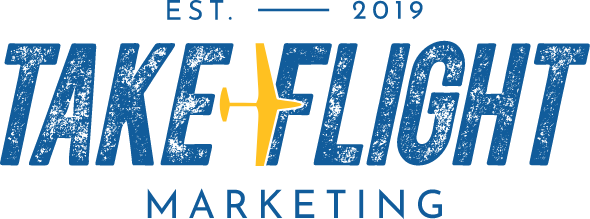How to Navigate Economic Change: 8 Strategic Marketing Tips for Resilient Brands
Navigating economic downturns doesn't always mean making drastic cuts or sweeping changes. Sometimes, the most powerful strategy involves becoming more focused, efficient, and agile. Economic uncertainty can serve as a critical opportunity for brands to refine their strategies, strengthen core competencies, and emerge stronger.
At Take Flight Marketing, we've consistently observed that businesses adopting thoughtful, deliberate strategies are better positioned to thrive, even amid challenging economic climates. How exactly can your brand proactively respond to economic uncertainty?
Here are 8 strategic moves boutique agencies like Take Flight Marketing make to put brands in the best position to succeed during times of economic uncertainty:
1. Stay Observant and Avoid Reactive Decisions
Economic uncertainty can trigger impulsive reactions, such as indiscriminate budget cuts or sudden shifts in strategy. Instead, remain observant and analyze market trends, competitor actions, and evolving consumer behaviors. Thoughtful, data-driven responses enable strategic decisions that strengthen your position rather than undermine it.
For instance, track consumer spending patterns closely. Observe which products or services remain essential and consider strategically repositioning your offerings to align closely with emerging consumer priorities.
2. Consolidate and Optimize Your Marketing Efforts
Efficiency becomes paramount during recessions. Review your existing marketing channels and identify those yielding the highest return on investment (ROI). Consolidating your marketing spend towards these high-performing channels ensures every dollar contributes directly to your primary objectives.
Use analytical tools to regularly assess your campaigns’ performance. Trim ineffective strategies and redirect resources towards proven tactics such as targeted digital ads, email marketing campaigns, and SEO-driven content marketing.
3. Prioritize High-Quality Creative and Content
As budgets tighten, the impact of your creative campaigns must increase. Quality content is a non-negotiable component of successful recession marketing strategies. Invest in developing compelling, highly relevant, and engaging content that captures attention and drives deeper connections with your audience.
Consider deploying storytelling tactics that resonate on an emotional level, providing clarity and reassurance during uncertain times. Authentic, relatable content not only captures attention but also fosters long-term customer loyalty.
4. Innovate Strategically—Fewer Tests, Bigger Ideas
Innovation doesn’t stop during economic downturns, it becomes even more crucial. However, your approach should become more intentional. Reduce the frequency of smaller-scale tests, and instead, concentrate your resources on fewer, high-impact innovations.
Taking calculated risks on big, meaningful initiatives positions your brand distinctly within your industry. Clearly define your innovation goals, focus on strategies with substantial potential returns, and avoid diluting efforts across too many smaller, less impactful projects.
5. Strengthen and Prioritize Customer Relationships
Customer retention becomes even more critical during recessions. Existing customers are often more valuable, as it’s generally more cost-effective to retain current customers than acquire new ones. Focus on personalized communication, enhanced customer support, and targeted loyalty programs.
Use CRM systems and customer insights to create tailored experiences. Address their specific pain points proactively, offer targeted incentives, and nurture these relationships consistently. Loyalty built during tough times translates into enduring customer relationships.
6. Remain Agile and Flexible
Rapid adaptation is essential during periods of economic uncertainty. Equip your team with real-time market insights and empower them to make swift, informed decisions. Flexibility allows your brand to quickly adjust to new opportunities or emerging challenges, giving you an advantage over competitors who struggle to pivot rapidly.
Regularly schedule briefings to reassess the market landscape and ensure your team has the resources and autonomy necessary to act decisively. Cultivating agility as a core organizational strength ensures your brand stays competitive regardless of economic conditions.
7. Maintain Transparent and Consistent Communication
Transparent communication is crucial in uncertain times, helping maintain trust among customers, employees, and stakeholders. Clearly communicate your brand’s position, ongoing challenges, and planned actions. Regular, open dialogue reassures stakeholders, builds confidence, and solidifies your reputation as a reliable and trustworthy brand.
Consider regular updates through newsletters, social media, or direct outreach, clearly outlining how your brand is adapting to the recession. Consistent transparency builds credibility and fosters lasting relationships.
8. Consider Making the Switch to a Smaller, Boutique Agency
Boutique marketing agencies excel during recessions because their agility, efficiency, and personalized approach uniquely positions them to swiftly adjust and optimize marketing strategies. Smaller, specialized teams can quickly pivot, make data-driven decisions, and deliver high-impact creative strategies more efficiently than larger agencies. Economic recessions do not have to equal decline. With the skilled assistance of a boutique agency, your brand can emerge stronger, slimmer, and more prepared for future success. Find out more about why boutique agencies have the upper hand during challenging times.
Curious about how a focused, boutique approach can significantly enhance your recession marketing strategy?Schedule a strategic call today, and let’s build your roadmap to resilience together.

